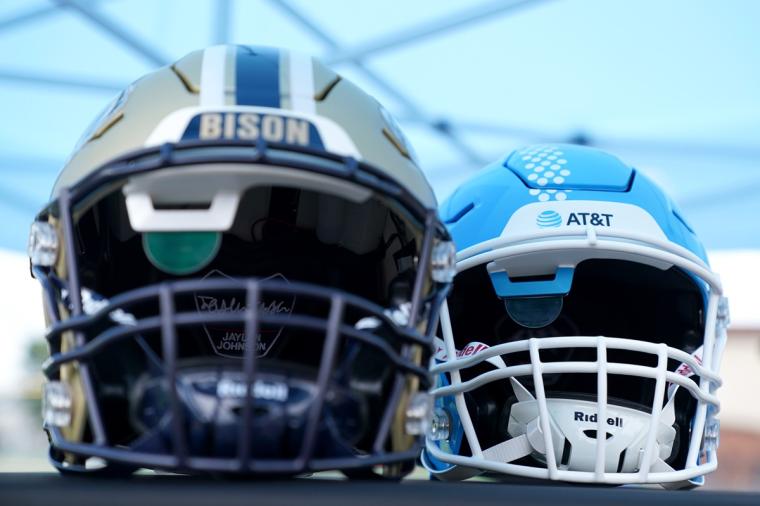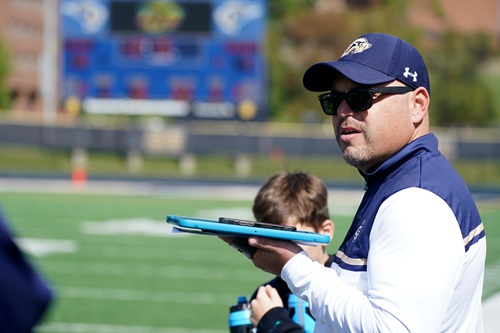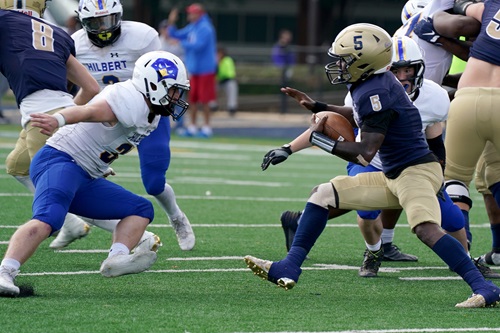
Little known fact: The football team at Gallaudet University, the leading college for students the leading university in the world for students who are deaf and hard of hearing, invented the huddle, the formation used in a multitude of other team sports today.
Yes, Gallaudet did. Really. It happened all the way back in 1894 because, in playing other teams who also relied on American Sign Language to communicate, the Gallaudet Bison did not want anyone to see their plays.
Gallaudet’s website notes, “Paul Hubbard, the quarterback, didn’t want to risk the other team seeing him use ASL to explain the play to his teammates, so he asked them to form a tight circle formation, now known as a huddle. Today, the huddle is used all over the world, in a wide variety of team sports, such as baseball, football, basketball, soccer, lacrosse and many other sports.”

It was new, it was simple, it was innovative and it literally changed the game. And now, almost 130 years later, Gallaudet is helping the sport gain more yardage among players who are deaf, thanks to a technology partnership with AT&T.
The two organizations, according to AT&T, have collaborated to create the first 5G-connected football helmet, making the game more inclusive by enhancing on-field communication for student-athletes who use American Sign Language:
“The helmet will allow coaches on the sideline to select a play from a tablet that will send the play to a lens inside the helmet. The quarterback wearing the helmet will receive the play in augmented reality on the digital display located within the visor. AT&T 5G provides the reliability and low latency for plays to be sent and received at a speed that keeps up with the pace of the game.”
USA TODAY notes that the helmet works via an AT&T microprocessor inside a Riddell helmet. It is connected to a lens mounted on the top of the helmet's facemask. A coach can select a play on a tablet and then send it to the player, who can then see the play displayed on the lens.
For a video of how the helmet works, click here.
The helmet (in which the 5G technology is the same type found in cellular phones) made its debut this fall in a game in which Gallaudet won, 34-20, over the Hilbert Hawks. In addition, Bison quarterback Brandon Washington was named the Eastern Collegiate Football Conference co-offensive player of the week for putting up 124 rushing yards and three touchdowns. Freshman quarterback Trevin Adams was also impressed with the capabilities of the new helmet.
"The stands were going crazy," Kellyn Smith Kenny, Chief Marketing and Growth Officer at AT&T told USA TODAY about the moment when Washington first made a touchdown. "I'm like turning around high-fiving everyone. It was so, so incredibly special.” (The exec was at the game to officially unveil the 5G-connected Riddell helmet and present a gift of $500,000 to the team.)
Gallaudet’s coach, Chuck Goldstein, told reporters that the hearing population might not understand the challenges the Bison face in each game.
 "Every other game that we prepare for, we do what we normally do and I think people don't realize is, when we communicate in our language, ASL, we're pretty fast. We're efficient. We're fast," he said. "What this does, this helps level the playing field with limiting mistakes, getting somebody's attention. When Trevin's in the game, and he's further away, he's not looking at me, I cannot get (his attention). We’re living with whatever play that’s called, that's it. This gives us an opportunity for me to get his attention. There’s a red exclamation point on the tablet, I hit it, it pops up. He knows automatically to stop what he's doing and look at me."
"Every other game that we prepare for, we do what we normally do and I think people don't realize is, when we communicate in our language, ASL, we're pretty fast. We're efficient. We're fast," he said. "What this does, this helps level the playing field with limiting mistakes, getting somebody's attention. When Trevin's in the game, and he's further away, he's not looking at me, I cannot get (his attention). We’re living with whatever play that’s called, that's it. This gives us an opportunity for me to get his attention. There’s a red exclamation point on the tablet, I hit it, it pops up. He knows automatically to stop what he's doing and look at me."
Special Teams Coordinator Shelby Bean, a Gallaudet alumnus and four-year player, told WBAL-TV in Baltimore the new helmet is a game changer by every definition.
"Unlimited possibilities for leveling the playing field, honestly. It's something that I never could have imagined can happen," Bean said.
"To know that it actually happened and we made history, it is even better than I thought," Goldstein told WJLA in Washington.

